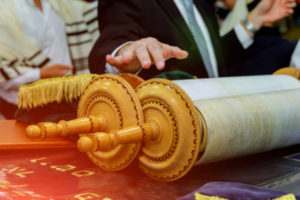
By Rabbi Abe Friedman
Parshat Miketz
One of the most-cherished ritual items in our house is a hanukkiyyah that my wife’s parents bought for us in Israel. What sets this hanukkiyyah apart from all of our others is its design, which will be familiar to anyone who has been in Israel for Chanukah: The candleholders sit inside a glass-walled box that allows you to light the hanukkiyyah outdoors without worrying that the wind will blow out the candles.
Even though each member of our family lights their own candles, lighting the “outside menorah” is the highlight every night: Everyone gathers on the front stoop, sometimes in PJs, sometimes bundled in coats and scarves against the snow, as we sing the blessings together.
The miracle of the oil — that a single jar of sacred oil could light the menorah in the Temple for eight days, until new oil could be produced in purity and brought to Jerusalem — is one of Judaism’s best-known stories. But what are we really celebrating when we remember this miracle?
We often look to this story for reassurance that, even in times of darkness and difficulty, all is never lost. The timing of our celebration reinforces this reading of the story. We celebrate Chanukah as we approach the winter solstice, as the nights grow longer.
The nighttime also gets darker as Chanukah begins: This is the only holiday we celebrate during the second half of the lunar month, as the moon’s light wanes each night toward the darkness of Rosh Hodesh. Here, the Chanukah candles tell us, in the darkest nights, we can still find light. All is never lost.
The Haftarah for Chanukah, the prophetic selection read on Shabbat morning, offers a different window onto the meaning of this holiday. The prophet Zekhariah lived in ambiguous times: the waning days of the Babylonian exile, the dawn of the Second Temple and the Jewish people’s return to our homeland in Israel. The facts on the ground could look very different, depending on one’s perspective.
In our Haftarah, Zekhariah sees a vision of Joshua, the still-exiled High Priest, as a broken man wearing soiled clothes and standing in judgment before the heavenly court. God intercedes directly, chastising the accusing angel and ordering that Joshua be given new, pure garments and restored to his post in the Temple. In Joshua’s defense, God refers to him with the unique phrase, “a brand plucked from the fire” (Zekhariah 3:2).
As a young boy Joshua witnessed the Temple’s complete destruction; grew up in exile, suffering unspeakable horrors; and now, in his elder years, will preside over the Temple’s restoration. Zekhariah’s overall vision is one of hope and renewal — but as the 19th-century commentator Malbim points out, the use of “brand,” is telling.
Brands are those pieces of wood that you find in the midway point of a bonfire: They have an untouched wooden core, but the outside of the log is deeply charred, cracked and ashen. Joshua has lived through exile to see redemption — and he is also indelibly marked by the experience.
When I light our “outside menorah” and watch the flames flicker and bend and struggle in the wind, it never seems certain that the light will catch against the darkness. Sometimes, in fact, it doesn’t — now and again the wind will blow out a candle or two before I can close the door, and I need to try again.
We can’t take for granted that our light will overcome the darkness. Each of us is, in our own way, a brand plucked from the fire. Life has marked us, charred our outsides, left us smoldering. Like the candles, we waver in difficult times. Sometimes our light goes out, and we need someone to rekindle our flame. We move between being a fragile glimmer of heat in the cold night air and a clear light beckoning in the darkness.
Chanukah reminds us that our defeats are not abject failures — and it also teaches us that our victories are rarely, if ever, total. We find life’s richness in the balance between. l
Rabbi Abe Friedman is the senior rabbi at Temple Beth Zion – Beth Israel. The Board of Rabbis of Greater Philadelphia is proud to provide diverse perspectives on Torah commentary for the Jewish Exponent. The opinions expressed in this column are the author’s own and do not reflect the view of the Board of Rabbis.
"light" - Google News
December 02, 2021 at 09:56PM
https://ift.tt/3rvT1TK
Light Can Overcome the Darkest Night - Jewish Exponent
"light" - Google News
https://ift.tt/2Wm8QLw
https://ift.tt/2Stbv5k
Bagikan Berita Ini














0 Response to "Light Can Overcome the Darkest Night - Jewish Exponent"
Post a Comment